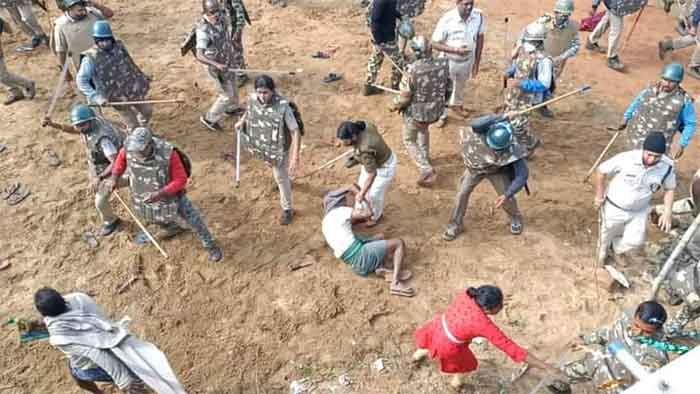
The struggle of the people of Dhinkia and nearby villagers ( in Jagatsinghpur district of Odisha) to save the local green rural economy based on dhana – mina – pana (paddy, fish and vines of betel leaves , apart from cashew nuts) from the onslaught of highly polluting big industries has acquired a new relevance and resonance in the middle of the acute environmental crisis of the 21st century which needs to be better understood and appreciated.
This is not to say that such struggles to protect the established sustainable livelihoods of rural communities were not relevant earlier. They were relevant then also as people have a strong democratic right to protect their livelihood. However in the ensuing debates often the side of the industrial onslaught could emerge stronger because the prevailing development paradigm favored it so much.
This is no more the case. In the 21st century, quite apart from the immediately experienced serious health hazards of pollution, it is increasingly realized that increased GHG emissions can endanger the essential life-nurturing conditions of our planet. Hence the need for protecting the green rural economy which communities have created and nurtured over the years is much stronger than before.
In the wake of this life-threatening crisis, for all those who care to see the emerging reality, the development paradigm has shifted much more in favor of protecting the green rural economy from any industrial onslaught. In the context of Dhinkia and nearby areas, if we compare the prevailing green economy with the industrial project onslaught which threatens to uproot it, in terms of pollution and GHG emissions what will emerge after what in official jargon is called ‘development’ will be highly polluting aggravation of climate disaster from which, incidentally, coastal areas are most threatened. If we look from the point of view of sustainable livelihoods of local people, again the present situation is much, much better. If we look from the point of biodiversity and the health and survival of all other species, again the present situation is much better. So why not shift the big industrial projects—steel or cement or power or others, if these are really as urgent as claimed–to those areas where displacement of green economy and greenery is not involved? Why destroy so much that is increasingly more valuable?
The people of this and several nearby villages have been involved in struggles to protect their dhana-mina-pana green economy for nearly 17 years. First they struggled against a multinational company POSCO. After several years of struggle which involved many protests, imprisonments, injuries, sacrifices, people succeeded in driving away the multinational company. However their relief was short-lived, as instead of returning all their land the government welcomed a local industrial giant for an even bigger integrated project, acquiring even more land for this, unleashing a new wave of repression and arrests, including the imprisonment of prominent leader of the people’s movement Debendra Swain.
In the course of the long history of repressions, several exhausted people in nearby villages have adjusted to accepting the new project, not out of happiness but because they have already suffered too much. At the same time, significant numbers of people are still carrying out the struggle courageously, despite the beatings, despite the arrests, despite the threats and the efforts to divide them.
This great resilience shown by the people for nearly 17 years in a peaceful democratic movement to save their green rural economy, community life and sustainable livelihoods is a big achievement, which all democratic forces should appreciate and support. We must remember that these rural households are mostly from relatively weaker section, and consider how difficult it must have been to sustain their long drawn out struggles in the midst of waves of repressions, imprisonments, implicating them in false cases, imposition of blockades and restrictions.
At a time when there is a worldwide search of green alternatives and increasing support for sustainable livelihoods based on this, their determination in the face of grim odds to protect such systems deserves appreciation and awards, not repression and imprisonments.
Generally the Odisha government in India is looked upon as a saner and more rational regime compared to several others in the country, with a relatively better record of stability and governance, with some of its welfare schemes and disaster protection works attracting much favorable notice. So its continuing repressive attitudes towards the Dhinkia struggle is a case of reason wounded, rationality ignored. Its continuing repressive and hostile actions appear to be driven more by vendetta and irrational hostility towards its own people.
The heartbeat of a genuinely democratic government should be close to the heartbeat of its people. The Odisha government must urgently change its policy of hostility and repression towards the Dhinkia movement, a movement which deserves the support of democratic forces as well as those committed to environment protection based on sustainable livelihoods of rural communities.
Bharat Dogra is Honorary Convener, Campaign to Save Earth Now. His recent books include Planet in Peril, Protecting Earth for Children and Man Over Machine—A Path to Peace.
This article was first published on https://countercurrents.org